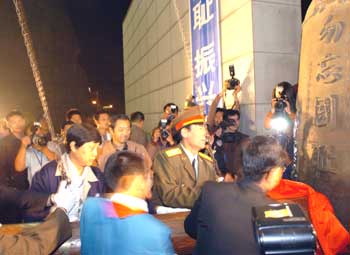|
Chinese don't love to hate Japanese; Due repentance urged
By MATTHEW FORNEY (Time)
Updated: 2005-12-12 10:07
You don't have to look far to see why Chinese grow up learning to hate Japan.
Take the forthcoming children's movie, "Little Soldier Zhang," which
Beijing-based director Sun Lijun says he made having "learned a lot from
Disney."

Locals of
Shenyang, northeast China's Liaoning Province, strike a bell to remember
the 73rd anniversary of Japan's invasion over China September 18,
2004. Commemorative activities were held in more than 100 Chinese cities.
[Xinhua] |
The film chronicles the adventures
in the 1930s of Little Zhang, a cute 12-year-old boy feeling his way through an
unfriendly world. But the resemblance to Pinocchio ends there. After Japanese
invaders shoot Little Zhang's grandmother in the back, the boy seeks revenge by
joining an underground Red Army detachment.
He moves among heroic Chinese patriots, sniveling collaborators and sadistic
Japanese. The finale comes with Little Zhang helping blow up a trainload of
Japanese soldiers and receiving a cherished reward: a pistol with which to kill
more Japanese.
"I thought about including one sympathetic Japanese character, but this is an
anti-Japan war movie and I don't want to confuse anyone," says Sun, who will
premier his film on International Children's Day.
Chinese kids can be forgiven for thinking Japan is a nation of "devils," a
slur used without embarrassment in polite Chinese society. They were raised to
feel that way, and not just through cartoons. Starting in elementary school
children learn reading, writing and the "Education in National Humiliation."
This last curriculum teaches that Japanese "bandits" brutalized China
throughout the 1930s and would do so today given half a chance. Although
European colonial powers receive their share of censure, the main goal is
keeping memories of Japanese conquest fresh.
Thousands of students each day, for instance, take class trips to the
Anti-Japanese War Museum in Beijing to view grainy photos of war atrocities ��
women raped and disemboweled, corpses of children stacked like cordwood. As one
15-year-old girl in a blue and yellow school uniform, Ji Jilan, emerged from a
recent visit to the gallery, she told a TIME correspondent: "After seeing this,
I hate Japanese more than ever."
So it is not surprising that this nationalist animosity reaches the highest
levels of government. The Chinese Premier, Wen Jiabao, recently created
shockwaves by saying he would refuse to meet with Japan's prime minister,
Junichiro Koizumi, at a ground-breaking summit of East Asian nations that begins
Monday.
Reasons include rising Japanese nationalism and a recent visit by the
Japanese Premier to the Yasukuni Shrine in Tokyo, which commemorates Japan's war
dead, including some war criminals from the time of Japan's invasion of China in
the 1930s. But underneath that diplomatic spat over history is a struggle for
power and influence in East Asia that is increasingly straining Beijing-Tokyo
relations.
"The China-Japan relationship in the near term is more tense and worrisome
than the potential for conflict elsewhere in the region," says Thomas
Christiansen, an expert in Asian security at Princeton University.
Of course, nobody expects China to forget the past. The war launched by
Japan's militarist leaders killed an estimated 20 million Chinese. During the
Rape of Nanjing in 1937-38, soldiers butchered 300,000 civilians, according to
Chinese figures.
Most Japanese are aware of what happened but their society has never engaged
in the type of introspection common in Germany after the Holocaust. Carefully
worded official apologies have landed far short of the five-star kowtow demanded
by Beijing, senior Tokyo officials occasionally deny atrocities and just last
April a new government-approved textbook written by right-wing groups downplayed
the wartime brutality visited on civilians.
|